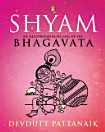Jaya: An Illustrated Retelling of the Mahabharata
Aug 2010 · Penguin UK
4.4star
519 reviews
Ebook
372
Pages
About this ebook
High above the sky stands Swarga, paradise, abode of the gods. Still above is Vaikuntha, heaven, abode of God. The doorkeepers of Vaikuntha are the twins, Jaya and Vijaya, both whose names mean ‘victory’. One keeps you in Swarga; the other raises you into Vaikuntha. In Vaikuntha there is bliss forever, in Swarga there is pleasure for only as long as you deserve. What is the difference between Jaya and Vijaya? Solve this puzzle and you will solve the mystery of the Mahabharata. In this enthralling retelling of India’s greatest epic, the Mahabharata, originally known as Jaya, Devdutt Pattanaik seamlessly weaves into a single narrative plots from the Sanskrit classic as well as its many folk and regional variants, including the Pandavani of Chattisgarh, Gondhal of Maharashtra, Terukkuttu of Tamil Nadu, and Yakshagana of Karnataka. Richly illustrated with over 250 line drawings by the author, the 108 chapters abound with little-known details such as the names of the hundred Kauravas, the worship of Draupadi as a goddess in Tamil Nadu, the stories of Astika, Madhavi, Jaimini, Aravan and Barbareek, the Mahabharata version of the Shakuntalam and the Ramayana, and the dating of the war based on astronomical data. With clarity and simplicity, the tales in this elegant volume reveal the eternal relevance of the Mahabharata, the complex and disturbing meditation on the human condition that has shaped Indian thought for over 3000 years.
Ratings and reviews
4.4
519 reviews
Palash Soni
- Flag inappropriate
- Show review history
November 11, 2024
I have been reading the works of Mr Devdutt Pattnaik for over a year now and I have become a fan of his collection. This book is another masterpiece of his like his "The Book of Ram". This book follows the story of the Mahabharata and does it in the best possible way. Consisting of stories collected by sages and retold as folklores it gives many insights and different perspectives of the numerous events in the epic. The author has also explained the significance of many things and given proper references of the stories which are presented, you will have a lot more knowledge about the Mahabharata, the Hindu religious principles, Indian culture and Dharma once you have finished reading this book. Written in simple and understandable language this is one of the best content made on the topic. Though not very detailed, it covers every small emotion of the characters, and at no point does it feel stretched or slow or rushed. So, readers, keep reading, and Devdutt sahab, keep writing. Thanks
Ashvin Lakshmikantha
- Flag inappropriate
January 8, 2015
I started reading the book and on the second page of it was written, "Abhimanyu, father of Arjuna". I was almost given up at this point, but continue to pardon this horrendous editing. It is most certainly an interesting read. There are probably over 100 novel insights. However, to those who have read the original Mahabhrata, it is rather unclear whether these insights are author's interpretations or whether it is what Vyasa intended. There were many that are simply wrong and do not conform to any Bharatha that I have read (For example Killing of Iravan, why Kunti stops after having 3 kids. These border on being down right absurd and contradictory, thereby doing great injustice to the epic). Some episodes that were a part of original Mahabharata are left out (Jayadratha's Penance for example) and some of them are interchanged. Some of the sub-stories show principles of jainism, which leads me to believe that the author relied on a Jain version of Bharatha. Lastly, the author reports 1 Billion deaths in the Kurukshetra war. I am horrified (not about the deaths, but at the author's math). 18 armies with 2 Lakh soldiers each fought the war not 1 Billion.
54 people found this review helpful
Rajat Pandey
- Flag inappropriate
August 30, 2019
We all know the overall story of Maharashtra,have read in school books or watched some or several adaptations of the epic in TV serials,yet this familiar story is presented in such a way that it feels like a total different story. This interpretation drives home the fact that there are no good or evil people,just good or evil acts which all must be accounted for either in this life or the next. The good old Indian philosophy of making sense of the non sensical world. Highly recommended.
13 people found this review helpful
Rate this ebook
Tell us what you think.
Reading information
Smartphones and tablets
Install the Google Play Books app for Android and iPad/iPhone. It syncs automatically with your account and allows you to read online or offline wherever you are.
Laptops and computers
You can listen to audiobooks purchased on Google Play using your computer's web browser.
eReaders and other devices
To read on e-ink devices like Kobo eReaders, you'll need to download a file and transfer it to your device. Follow the detailed Help Center instructions to transfer the files to supported eReaders.







